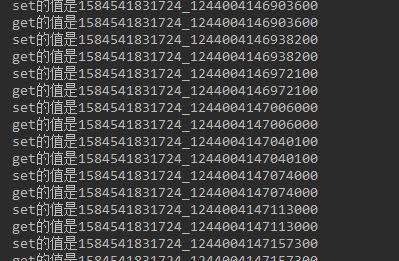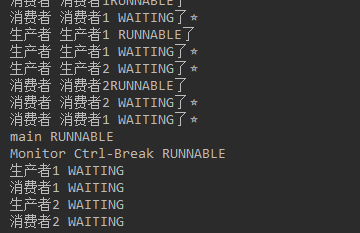Java多线程生产者消费者模式实现过程解析
单生产者与单消费者
示例:
public class ProduceConsume { public static void main(String[] args) { String lock = new String(''); Produce produce = new Produce(lock); Consume consume = new Consume(lock); new Thread(() -> {while (true) { produce.setValue();} }, 'ProductThread').start(); new Thread(() -> {while (true) { consume.getValue();} }, 'ConsumeThread').start(); } /** * 生产者 */ static class Produce { private String lock; public Produce(String lock) {this.lock = lock; } public void setValue() {try { synchronized (lock) { if (!ValueObject.value.equals('')) { lock.wait(); } String value = System.currentTimeMillis() + '_' + System.nanoTime(); System.out.println('set的值是' + value); ValueObject.value = value; lock.notify(); }} catch (InterruptedException e) { e.printStackTrace();} } } /** * 消费者 */ static class Consume { private String lock; public Consume(String lock) {this.lock = lock; } public void getValue() {try { synchronized (lock) { if (ValueObject.value.equals('')) { lock.wait(); } System.out.println('get的值是' + ValueObject.value); ValueObject.value = ''; lock.notify(); }} catch (InterruptedException e) { e.printStackTrace();} } } static class ValueObject { public static String value = ''; }}
执行结果如下:

多生产者与多消费者
这种模式下,容易出现“假死”,也就是全部线程都进入了 WAITNG 状态,程序不在执行任何业务功能了,整个项目呈停止状态。
示例:
public class MultiProduceConsume { public static void main(String[] args) throws InterruptedException { String lock = new String(''); Produce produce = new Produce(lock); Consume consume = new Consume(lock); Thread[] pThread = new Thread[2]; Thread[] cThread = new Thread[2]; for (int i = 0; i < 2; i++) { pThread[i] = new Thread(() -> {while (true) { produce.setValue();} }, '生产者' + (i + 1)); cThread[i] = new Thread(() -> {while (true) { consume.getValue();} }, '消费者' + (i + 1)); pThread[i].start(); cThread[i].start(); } Thread.sleep(5000); Thread[] threadArray = new Thread[Thread.currentThread().getThreadGroup().activeCount()]; Thread.currentThread().getThreadGroup().enumerate(threadArray); for (int i = 0; i < threadArray.length; i++) { System.out.println(threadArray[i].getName() + ' ' + threadArray[i].getState()); } } static class Produce { private String lock; public Produce(String lock) { this.lock = lock; } public void setValue() { try {synchronized (lock) { while(!ValueObject.value.equals('')) { System.out.println('生产者 ' + Thread.currentThread().getName() + ' WAITING了⭐'); lock.wait(); } System.out.println('生产者 ' + Thread.currentThread().getName() + ' RUNNABLE了'); String value = System.currentTimeMillis() + '_' + System.nanoTime(); ValueObject.value = value; lock.notify();} } catch (InterruptedException e) {e.printStackTrace(); } } } static class Consume { private String lock; public Consume(String lock) { this.lock = lock; } public void getValue() { try {synchronized (lock) { while (ValueObject.value.equals('')) { System.out.println('消费者 ' + Thread.currentThread().getName() + ' WAITING了⭐'); lock.wait(); } System.out.println('消费者 ' + Thread.currentThread().getName() + 'RUNNABLE了'); ValueObject.value = ''; lock.notify();} } catch (InterruptedException e) {e.printStackTrace(); } } } static class ValueObject { public static String value = ''; }}
运行结果如图:

分析:
虽然代码中通过 wait/notify 进行通信了,但是不能保证 notify 唤醒的一定是异类,也可能是同类,比如“生产者”唤醒了“生产者”这样的情况。
解决方案:
假死出现的主要原因是有可能连续唤醒了同类。所以解决方案很简单,就是把 notify() 改为 notifyAll() 即可。
以上就是本文的全部内容,希望对大家的学习有所帮助,也希望大家多多支持好吧啦网。
相关文章:

 网公网安备
网公网安备